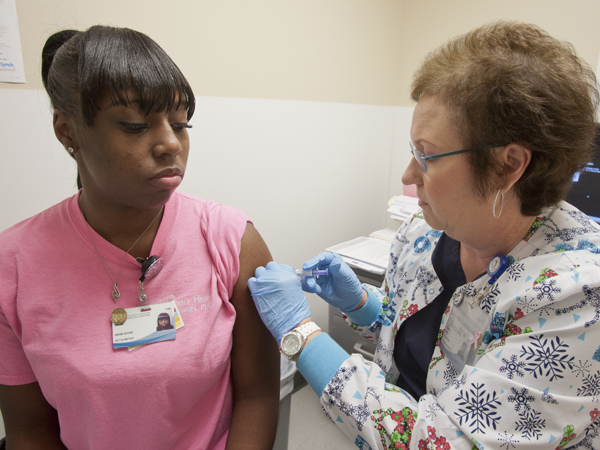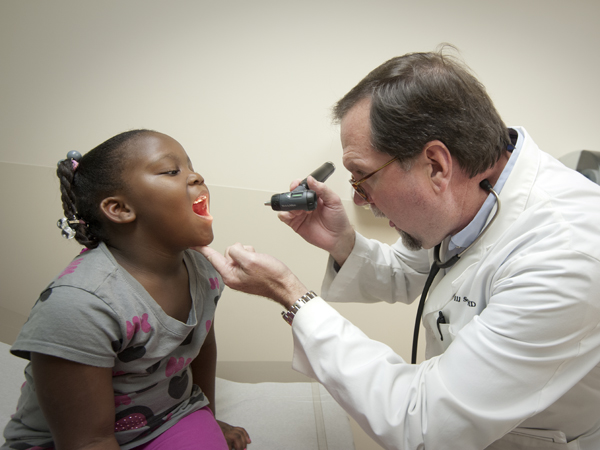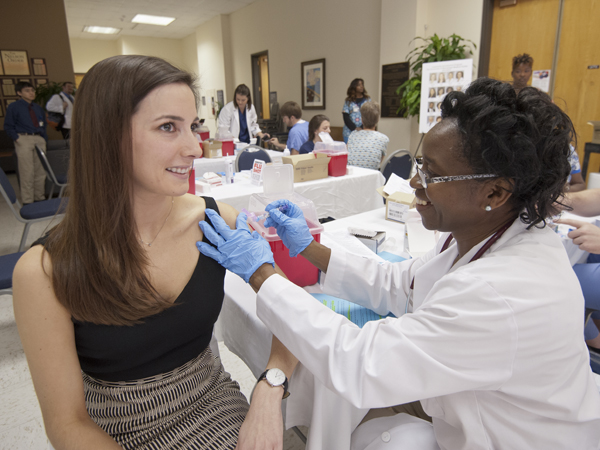Recovering from flu: Slow down, watch for danger signs

Tuesday is the deadline for all UMMC students and employees to receive the mandatory flu vaccine. The immunization is free at the Office of Student/Employee Health, and hours have been extended today and Tuesday to 7 a.m.-7 p.m.
All employees and students are required to have received the flu vaccine by the end of the workday Tuesday. For more information, call the office at 4-1192. To review UMMC’s flu policy, go to http://bit.ly/1r4KpMK.
Catching the season’s flu is as easy as walking by someone already sickened as they cough or sneeze, experts warn.
But recovering from a virus that can knock you to your knees for days on end? That can be a tough one, especially if you try to hurry the process or cut corners on taking care of yourself.
Here’s why a good recovery from the flu is important, says Dr. Will Sorey, University of Mississippi Medical Center professor of pediatrics. “It affects just about every part of your body except your hair, your brain and your toenails. It’s a systemic illness, and it’s probably one of the more dangerous infections over a period of history than any of the Biblical plagues.”
As the nation observes the Centers for Disease Control’s Dec. 7-13 National Influenza Vaccination Week, experts urge residents to roll up their sleeves before they find themselves down for the count.
CDC officials also say this year’s vaccine might not be as effective as in previous years because the current strain of the virus has mutated. That could mean more hospitalizations and deaths.
“Don’t be foolish enough not to get a flu vaccine,” Sorey said. “That vaccine could be the difference between you living, and you dying.

Sorey and other UMMC health-care professionals encourage flu victims to take critical steps for a smart and safe recovery. And along the way, they say, take precautions not to pass on the nasty virus to friends, family, fellow students and coworkers, and especially those whose immune systems are already compromised.
“The worst thing is that we come to work when we have the flu,” said Dr. Joyce Olutade, medical director of the Student/Employee Health Center. “Then, we spread it among ourselves. Stay home. Someone else will take care of your job.”
They advise those stricken with the flu to remember they must take care of themselves, even if they feel so rotten they only want to curl up in bed or on their sofa. Taking the prescription drug Tamiflu at the first sign of the virus might lessen its duration by a day or so, but won’t deflect it, they say.
“Some people have the flu, and they are hurting or have fever, but they don’t take anything for it,” said Olutade, whose clinic sees a dozen or more students a day during peak flu season. “At least take ibuprofen or Tylenol to relieve the fever, the aches and the pains. You will feel more comfortable for it.
“Not drinking enough fluids and not taking anything for fever are the two things I see people neglect to do,” she said. “If you don’t feel like eating, you can drink soup, tea or sports drinks. Even if you don’t have an appetite, you need to drink fluids to keep yourself hydrated.”
Flu patients need to be aware that their endurance “is going to be very poor,” Sorey said. “Flu makes your muscles weak. If you start trying to run a marathon the day after your fever goes away, you will wear yourself out, and you may damage tissue if you push hard.”
And Sorey cautions that for both children and adults, feeling worse as the flu progresses is a huge red flag. “You can get secondary infections after the flu, and pneumonia is a big one,” Sorey said. “If you get better, then get worse, that needs to be addressed immediately by a doctor.”
Said Gerry Gray-Lewis, nurse manager of family medicine: “At the first sign of any complications, get yourself back to the doctor. There’s a certain percentage of people who will also get pneumonia, and you may be in that small percentage where the flu will knock you on your socks.”

Often, Olutade said, flu victims will ask their health-care provider to give them antibiotics, or a shot to pep them up. “People say they want a Z-Pak,” she said, referring to the antibiotic Zithromax prescribed for bacterial infections. “Flu is a virus. An antibiotic won’t make any difference. And, they want a Decadron shot. That will not help with the symptoms of the flu.”
Instead, Gray-Lewis suggests, “Go home. Just go to bed and rest. You need to have good hand washing, and good Kleenex and a good trash can nearby. You will feel miserable, and being horizontal in bed in your most comfortable PJs and a quilt brings comfort.
“Try eating your comfort food from childhood. Anything like that – things we associate with being taken care of – is a great thing,” she said. “My grandmother always made hot tea, and she put milk and sugar in it. That’s something I like when I’m sick.”
If you think you can kick the flu in a couple of days, you’re wrong, the experts say. “The cough can last up to two weeks,” Olutade said, adding that over-the-counter cough syrups will ease symptoms.
“The biggest thing we tell patients at our clinic is that flu can last a good week. Don’t expect to go back to school for a full week,” said Dr. Tami Brooks, assistant professor of pediatrics.
“I see a lot of cases where kids and parents want to get back to sports. You don’t need to play competitive sports the day after you’re fever free,” she said. “You need to give your body the rest and fluids to recover well.”
Parents of very young children often worry about fluid intake when little ones are too nauseated to hold down food or liquids, Brooks said. “Give popsicles to kids older than 2, and children younger than 2 can have Pedialyte popsicles that can be crushed up,” Brooks said. “They don’t need a regular diet. They just need to stay hydrated, and they need to urinate every four to six hours.”
“In recovery, easy does it,” Sorey advises. “If you work too hard, you can cause a cascade of problems. Use common sense in nutrition. Don’t try to gain all of your weight back in one sitting.”
Just get your flu shot now if you haven’t already, Sorey advises.
“I hope people aren’t being lulled into a false sense of security,” he said. “The (flu) hammer comes down about every four years. I don’t know if this will be the year or not, but this disease needs to be treated with more respect than it gets.”
Flu Do's and Don'ts
DO stay home from work or school so that you don’t infect others and hinder your own recovery.
DO take your recovery slowly and seriously. Just because you’re fever free doesn’t mean you are well.
DON’T forget to drink and stay hydrated, even though you don’t feel like eating.
DON’T ignore worsening symptoms, or getting better, then worse. Call your health-care provider immediately.
Caring For Someone With The Flu
The Centers for Disease Control recommends giving a sick person his own room. If more than one person has flu, they can share a room.
Have sick people use the same bathroom and well people use a different bathroom, if possible. Give each sick person his own drinking glass, washcloth and towel. Caregivers should wash their own hands frequently.
When You Suspect You Have the Flu
Most people with flu should stay home and avoid contact with others except to get medical care. Consult your health-care provider about whether you should go to a health-care provider for a diagnosis.
Go to the ER if you or a child have emergency warning signs such as fast breathing or trouble breathing, bluish skin color, not waking up or interacting, infants or small children not wanting to be held, flu symptoms that improve but then return with a worse cough or fever, fever with a rash, pain or pressure in chest or abdomen, dizziness or confusion, severe vomiting, and worse cough.
Get medical help immediately for an infant who is unable to eat, has trouble breathing, no tears when crying, and significantly fewer wet diapers than normal.


